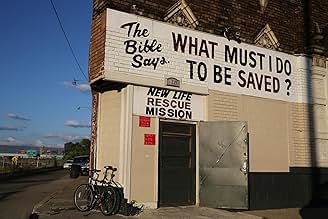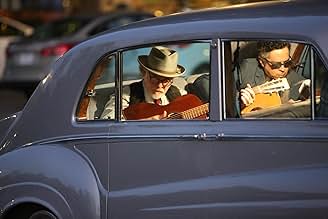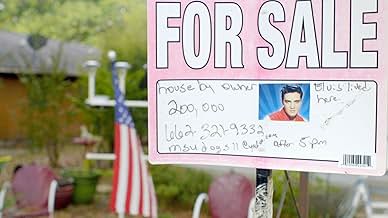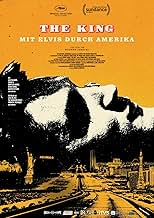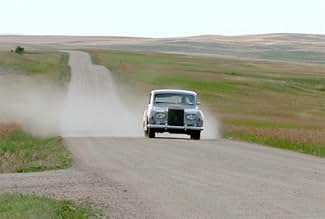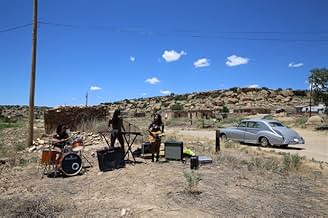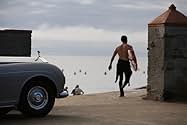IMDb RATING
6.9/10
1.3K
YOUR RATING
Forty years after the death of Elvis Presley, a musical road trip across America in his 1963 Rolls Royce explores how a country boy lost his authenticity and became a king while his country ... Read allForty years after the death of Elvis Presley, a musical road trip across America in his 1963 Rolls Royce explores how a country boy lost his authenticity and became a king while his country lost her democracy and became an empire.Forty years after the death of Elvis Presley, a musical road trip across America in his 1963 Rolls Royce explores how a country boy lost his authenticity and became a king while his country lost her democracy and became an empire.
- Director
- Writers
- Stars
- Awards
- 1 win & 10 nominations total
Elvis Presley
- Self
- (archive footage)
Mike Tyson
- Self
- (archive footage)
EmiSunshine
- Self
- (as Emi Sunshine & The Rain)
Franklin D. Roosevelt
- Self
- (archive footage)
Leo Bud Welch
- Self
- (as Leo "Bud" Welch)
Martin Luther King
- Self
- (archive footage)
- Director
- Writers
- All cast & crew
- Production, box office & more at IMDbPro
Featured reviews
Still ruminating on this one. The film tries to compare the career of Elvis Presley to the rise and fall of the American dream. While taking a road trip in one of Elvis' Rolls Royce's (not a trademark Cadillac) and interviewing celebs, people who knew him, and people who didn't but live near where he did. Ambitious. Thought provoking. Originally called Promised Land then changed to The King. Just like the change of the title, the allegory doesn't quite work.
Unorthodox documentary not so much "about" Elvis Presley, but about how Elvis affected --and was affected by -- American culture. The gimmick Director Eugene Jarecki employs is that he purchased Elvis' actual Rolls Royce, and then films interviews of a wide variety of folks in that vehicle as it travels across the places that Elvis himself stayed at various points in his life, from his hometown in Tupelo Mississippi to Memphis (although, curiously, Graceland is barely mentioned) and places in between.
Even though Jarecki doesn't give us a straightforward biography of Presley, THE KING does a pretty fine job of covering the bases, even if indirectly. The most effective part of the Doc comes early on in a discussion of whether Elvis was a cultural appropriator of black music, culminating in his early crowning as The King Of Rock And Roll. The movie gives a fair-minded balance of pro and con with people like Presley's guitarist Scotty Moore, Emmylou Harris and John Hiatt on one side and rapper Chuck D on the other (he, of the infamous song lyric: "Elvis was a hero to most. But he never meant **** to me you see."). There's also a clip of Big Mama Thornton's blistering original version of "Hound Dog". Jarecki then follows Elvis' travels to NYC and even bigger fame and riches. Then, it's off to the Army and Presley's decline into B movies and Vegas schmaltz. The clips of 'fat Elvis' at the end are truly shocking even all these decades later.
Where Jarecki over-reaches is that he isn't satisfied just showing Elvis' effect on the public, but then tries to tie it in with today's culture wars. Shot during the 2016 campaign with such guests as Alec Baldwin, Van Jones and James Carville, Jarecki makes tenuous connections. VERY tenuous connections. No question that Elvis was a seismic force when he hit, but, save for the brief glory period after the '68 Comeback Special, Presley can hardly be looked upon as a central artistic force after the very early 60s. While significant figures can certainly have a long influence, the fact that Elvis passed on in 1977 makes it a stretch to say that he is symbol of our Red-Blue state America today. If anything, Elvis is the very definition of 'Purple' celebrity - equally loved by all demos.
Even with this central flaw, there is no question that THE KING is a dense, engaging Documentary. One can't help but feel that they have gone on some sort of journey itself, much like Elvis's well-traveled Rolls itself.
Even though Jarecki doesn't give us a straightforward biography of Presley, THE KING does a pretty fine job of covering the bases, even if indirectly. The most effective part of the Doc comes early on in a discussion of whether Elvis was a cultural appropriator of black music, culminating in his early crowning as The King Of Rock And Roll. The movie gives a fair-minded balance of pro and con with people like Presley's guitarist Scotty Moore, Emmylou Harris and John Hiatt on one side and rapper Chuck D on the other (he, of the infamous song lyric: "Elvis was a hero to most. But he never meant **** to me you see."). There's also a clip of Big Mama Thornton's blistering original version of "Hound Dog". Jarecki then follows Elvis' travels to NYC and even bigger fame and riches. Then, it's off to the Army and Presley's decline into B movies and Vegas schmaltz. The clips of 'fat Elvis' at the end are truly shocking even all these decades later.
Where Jarecki over-reaches is that he isn't satisfied just showing Elvis' effect on the public, but then tries to tie it in with today's culture wars. Shot during the 2016 campaign with such guests as Alec Baldwin, Van Jones and James Carville, Jarecki makes tenuous connections. VERY tenuous connections. No question that Elvis was a seismic force when he hit, but, save for the brief glory period after the '68 Comeback Special, Presley can hardly be looked upon as a central artistic force after the very early 60s. While significant figures can certainly have a long influence, the fact that Elvis passed on in 1977 makes it a stretch to say that he is symbol of our Red-Blue state America today. If anything, Elvis is the very definition of 'Purple' celebrity - equally loved by all demos.
Even with this central flaw, there is no question that THE KING is a dense, engaging Documentary. One can't help but feel that they have gone on some sort of journey itself, much like Elvis's well-traveled Rolls itself.
The King is essentially three or four really good documentaries edited into one and that's where the trouble starts. Elvis' life and career are fascinating to watch. And the lies on which the American dream is built - stolen land, slavery, apartheid, the corrupted political system - deserve every effort to refocus public awareness. The roadtrip in Elvis' old Rolls Royce is a nice idea. Just that trying to link his rise and fall to all that happens in America over the past 70 years seems forced and doesn't give each story the necessary time and attention. Viewing The King I felt like watching an interesting docu on TV while someone else got hold of the remote and constantly switches to another channel. 8 Stars for the original idea, 2 Stars for execution.
"Celebrity is the industrial disease of creativity." Mike Myers
It is commonly thought that America is in decline for the greatness it knew after WWII. Writer/director Eugene Jarecki has a vision in The King of a similar decline in Elvis Presley' life from unique, authentic talent to a has-been dead in his forties. This best-so-far-this-year documentary begs us to consider the analogy although to its credit, it does not force the similarities.
The film's interesting conceit suggests that both subjects bear their own responsibility for their descent-Elvis giving into commercialism and drugs, America, well, introducing itself to solipsism and commercialism, culminating in the election of Donald Trump. While America is a decline in progress, Elvis gave up 30 years ago but has never been forgotten.
That's the rub-he achieved artistically and financially beyond even Col. Parker's wildest expectations, but Elvis was not able to handle the fame or the money. Or maybe when you can buy all the cheeseburgers and drugs you want, you can watch your belly grow as your mind shuts down. Jarecki uses Elvis's 1963 Rolls Royce to have performers like Immortal Technique and Emi Sunshine sing in the back seat about America.
As Jarecki winds in the Rolls from Memphis to New York, Vegas, and back to Memphis, it slowly becomes clear this should been one of Elvis's pretty Cadillac's; how ironically perfect that it's a Rolls, so out of touch with his roots.
Besides the simple lamentation of greatness gone too soon is the argument that Elvis appropriated Black culture on his road to fame and wealth. Although arguments abound on both sides, this point illustrates the varied richness Jarecki brings to his documentary,
At any rate, having just watched Whitney about her great voice and its descent with the help of drugs, I am dismayed that such is sometimes the fate of the great. America is no different, and the frequently-montaged images from presidents to celebrities are sometimes surprising, sometimes depressing, but never dull. Jarecki has a gallery of shots that would be impressive even without sound. It's a museum of our glory and our loss.
Along this nostalgic road, and America itself seems to be stuck there without a clue about how to save its future from the decision it made in 2016, is the prevailing idea that Elvis also followed the money and the easy way. We see how he ended up, so can we learn and make some tough decisions now?
It is commonly thought that America is in decline for the greatness it knew after WWII. Writer/director Eugene Jarecki has a vision in The King of a similar decline in Elvis Presley' life from unique, authentic talent to a has-been dead in his forties. This best-so-far-this-year documentary begs us to consider the analogy although to its credit, it does not force the similarities.
The film's interesting conceit suggests that both subjects bear their own responsibility for their descent-Elvis giving into commercialism and drugs, America, well, introducing itself to solipsism and commercialism, culminating in the election of Donald Trump. While America is a decline in progress, Elvis gave up 30 years ago but has never been forgotten.
That's the rub-he achieved artistically and financially beyond even Col. Parker's wildest expectations, but Elvis was not able to handle the fame or the money. Or maybe when you can buy all the cheeseburgers and drugs you want, you can watch your belly grow as your mind shuts down. Jarecki uses Elvis's 1963 Rolls Royce to have performers like Immortal Technique and Emi Sunshine sing in the back seat about America.
As Jarecki winds in the Rolls from Memphis to New York, Vegas, and back to Memphis, it slowly becomes clear this should been one of Elvis's pretty Cadillac's; how ironically perfect that it's a Rolls, so out of touch with his roots.
Besides the simple lamentation of greatness gone too soon is the argument that Elvis appropriated Black culture on his road to fame and wealth. Although arguments abound on both sides, this point illustrates the varied richness Jarecki brings to his documentary,
At any rate, having just watched Whitney about her great voice and its descent with the help of drugs, I am dismayed that such is sometimes the fate of the great. America is no different, and the frequently-montaged images from presidents to celebrities are sometimes surprising, sometimes depressing, but never dull. Jarecki has a gallery of shots that would be impressive even without sound. It's a museum of our glory and our loss.
Along this nostalgic road, and America itself seems to be stuck there without a clue about how to save its future from the decision it made in 2016, is the prevailing idea that Elvis also followed the money and the easy way. We see how he ended up, so can we learn and make some tough decisions now?
Greetings again from the darkness. Those of us in the United States have always loved a rags-to-riches success story ... it's the personification of the American Dream. The only thing we seem to enjoy more is tearing down the pedestals that we build for those folks, and then ripping apart their legacy. Acclaimed director Eugene Jarecki (WHY WE FIGHT, 2005) strains rigorously in his attempts to connect Elvis Presley selling out his talent for money with the transformation of the U.S. from a democracy to a crumbling capitalistic empire (likened to ancient Rome). The really interesting thing is that the film, despite being a staccato mess, is quite fascinating.
Director Jarecki's gimmick here is that he is taking a musical and historic road trip in the 1963 Rolls Royce once owned by Elvis. Along the way, he picks up passengers - some of which are musicians who perform in the backseat. The passenger list includes James Carville, John Hiatt, M Ward, Linda Thompson (ex-girlfriend of Elvis), Immortal Technique, and "best friend" Jerry Schilling (a comical description if you've read his book).
Chuck D from Public Enemy is interviewed due to his famous lyric: "Elvis was a hero to most, but he never meant s**t to me". The contradictions from this interview fit nicely with the contradictions throughout the film. George Klein takes Jarecki on a quick tour of Humes High School, and Ashton Kutcher babbles about fame - though he makes one spot on remark regarding the prison of fame, something much of the film seems to ignore. Producer Ethan Hawke spends a good amount of time on camera and in the front seat, while author and activist Van Jones seems narrowly focused on cultural appropriation and angry that Elvis never used his clout to help the minorities that influenced him.
Filmed in 2016, the film works hard to include the Presidential election, and we even see the sanctimonious Alec Baldwin adamantly proclaiming that Trump won't win. Jarecki is himself an activist, and here he stretches to prove his points - tying together everything from Elvis' induction into the Army to the Trump election more than a half-century later (and 40 years after his death). The road trip kicks off in Elvis' birthplace of Tupelo, where we meet some locals who talk about the lasting impact of Elvis on their town - a town still drenched in poverty. Memphis is next, and we hear about the 3 local kings: BB, Elvis and MLK. Jarecki even inserts a shot of the Rolls next to the Lorraine Motel. There is a terrific bit with the students from Stax Music Academy who perform "Chain of Fools" in the backseat. We then head to NYC and Nashville, capping off the musically creative portion of Elvis' career. Next up is Hollywood, Hawaii, and finally Las Vegas.
At times, the film is just flat out weird. One segment force feeds parallels with the 1933 King Kong movie (yes, really), then Elvis as a tourist, and finally, Dan Rather's all too familiar voice performing "America the Beautiful" ... each piece featuring the Empire State Building. But just when a Bernie Sanders rally makes you want to turn off the film, we get an insightful Mike Myers effectively pointing out the hypocrisy of the American Dream as sold by the government, or David Simon questioning the choice of the Rolls over one of Elvis' prized Cadillacs, or Sam Phillips' (Sun Records) son re-telling the story of how his father lost Elvis to the carnival-barker Colonel Tom Parker (neither a Colonel nor a Parker).
Jarecki and co-writer Christopher St. John try to weave a tapestry of fame and money with cultural and societal shifts. Some segments work, while others fall flat. The editing of talking heads sometimes gives the feel of a debate, but often the scattered and choppy film meanders through multiple messages whilst driving the backroads of the country. We get clips of Elvis on the Ed Sullivan Show and getting his famous locks sheared in the Army, and the 1968 comeback special; however, there is little mention of Priscilla, Lisa Marie or Graceland.
Judging Elvis for money grab without seeming to take into account his young age (he was 21 when he first appeared on Sullivan, and 23 at his Army induction) and his extreme poverty of youth, much less the power of his domineering agent, seems to be harsh judgement in an era that had never seen such media giants as the Kardashians or Justin Bieber. When Jarecki's road chief admits, "I don't know what the hell you're doing" (when Jarecki asks him what he thinks he's doing with the movie), it's the first time we can actually relate to what someone has said. Despite all of that, you'll likely be glued to the screen for the full run time - either enjoying the songs, watching the clips, or trying to see if Jarecki's puzzle pieces even fit together.
Director Jarecki's gimmick here is that he is taking a musical and historic road trip in the 1963 Rolls Royce once owned by Elvis. Along the way, he picks up passengers - some of which are musicians who perform in the backseat. The passenger list includes James Carville, John Hiatt, M Ward, Linda Thompson (ex-girlfriend of Elvis), Immortal Technique, and "best friend" Jerry Schilling (a comical description if you've read his book).
Chuck D from Public Enemy is interviewed due to his famous lyric: "Elvis was a hero to most, but he never meant s**t to me". The contradictions from this interview fit nicely with the contradictions throughout the film. George Klein takes Jarecki on a quick tour of Humes High School, and Ashton Kutcher babbles about fame - though he makes one spot on remark regarding the prison of fame, something much of the film seems to ignore. Producer Ethan Hawke spends a good amount of time on camera and in the front seat, while author and activist Van Jones seems narrowly focused on cultural appropriation and angry that Elvis never used his clout to help the minorities that influenced him.
Filmed in 2016, the film works hard to include the Presidential election, and we even see the sanctimonious Alec Baldwin adamantly proclaiming that Trump won't win. Jarecki is himself an activist, and here he stretches to prove his points - tying together everything from Elvis' induction into the Army to the Trump election more than a half-century later (and 40 years after his death). The road trip kicks off in Elvis' birthplace of Tupelo, where we meet some locals who talk about the lasting impact of Elvis on their town - a town still drenched in poverty. Memphis is next, and we hear about the 3 local kings: BB, Elvis and MLK. Jarecki even inserts a shot of the Rolls next to the Lorraine Motel. There is a terrific bit with the students from Stax Music Academy who perform "Chain of Fools" in the backseat. We then head to NYC and Nashville, capping off the musically creative portion of Elvis' career. Next up is Hollywood, Hawaii, and finally Las Vegas.
At times, the film is just flat out weird. One segment force feeds parallels with the 1933 King Kong movie (yes, really), then Elvis as a tourist, and finally, Dan Rather's all too familiar voice performing "America the Beautiful" ... each piece featuring the Empire State Building. But just when a Bernie Sanders rally makes you want to turn off the film, we get an insightful Mike Myers effectively pointing out the hypocrisy of the American Dream as sold by the government, or David Simon questioning the choice of the Rolls over one of Elvis' prized Cadillacs, or Sam Phillips' (Sun Records) son re-telling the story of how his father lost Elvis to the carnival-barker Colonel Tom Parker (neither a Colonel nor a Parker).
Jarecki and co-writer Christopher St. John try to weave a tapestry of fame and money with cultural and societal shifts. Some segments work, while others fall flat. The editing of talking heads sometimes gives the feel of a debate, but often the scattered and choppy film meanders through multiple messages whilst driving the backroads of the country. We get clips of Elvis on the Ed Sullivan Show and getting his famous locks sheared in the Army, and the 1968 comeback special; however, there is little mention of Priscilla, Lisa Marie or Graceland.
Judging Elvis for money grab without seeming to take into account his young age (he was 21 when he first appeared on Sullivan, and 23 at his Army induction) and his extreme poverty of youth, much less the power of his domineering agent, seems to be harsh judgement in an era that had never seen such media giants as the Kardashians or Justin Bieber. When Jarecki's road chief admits, "I don't know what the hell you're doing" (when Jarecki asks him what he thinks he's doing with the movie), it's the first time we can actually relate to what someone has said. Despite all of that, you'll likely be glued to the screen for the full run time - either enjoying the songs, watching the clips, or trying to see if Jarecki's puzzle pieces even fit together.
Did you know
- TriviaThe car featured in the documentary is a 1963 Rolls Royce Phantom V touring limousine with coachwork by James Young and was owned by Elvis. It was bought by the film makers at Bonhams auction in 2014 for $396000. It was resold after filming and now resides at the Hard Rock Hotel & Casino in Las Vegas.
- ConnectionsFeatures King Kong (1933)
- How long is The King?Powered by Alexa
Details
- Release date
- Countries of origin
- Official site
- Language
- Also known as
- Promised Land
- Filming locations
- Production companies
- See more company credits at IMDbPro
Box office
- Gross US & Canada
- $259,291
- Opening weekend US & Canada
- $29,050
- Jun 24, 2018
- Gross worldwide
- $273,601
- Runtime1 hour 47 minutes
- Color
- Aspect ratio
- 2.35 : 1
Contribute to this page
Suggest an edit or add missing content




